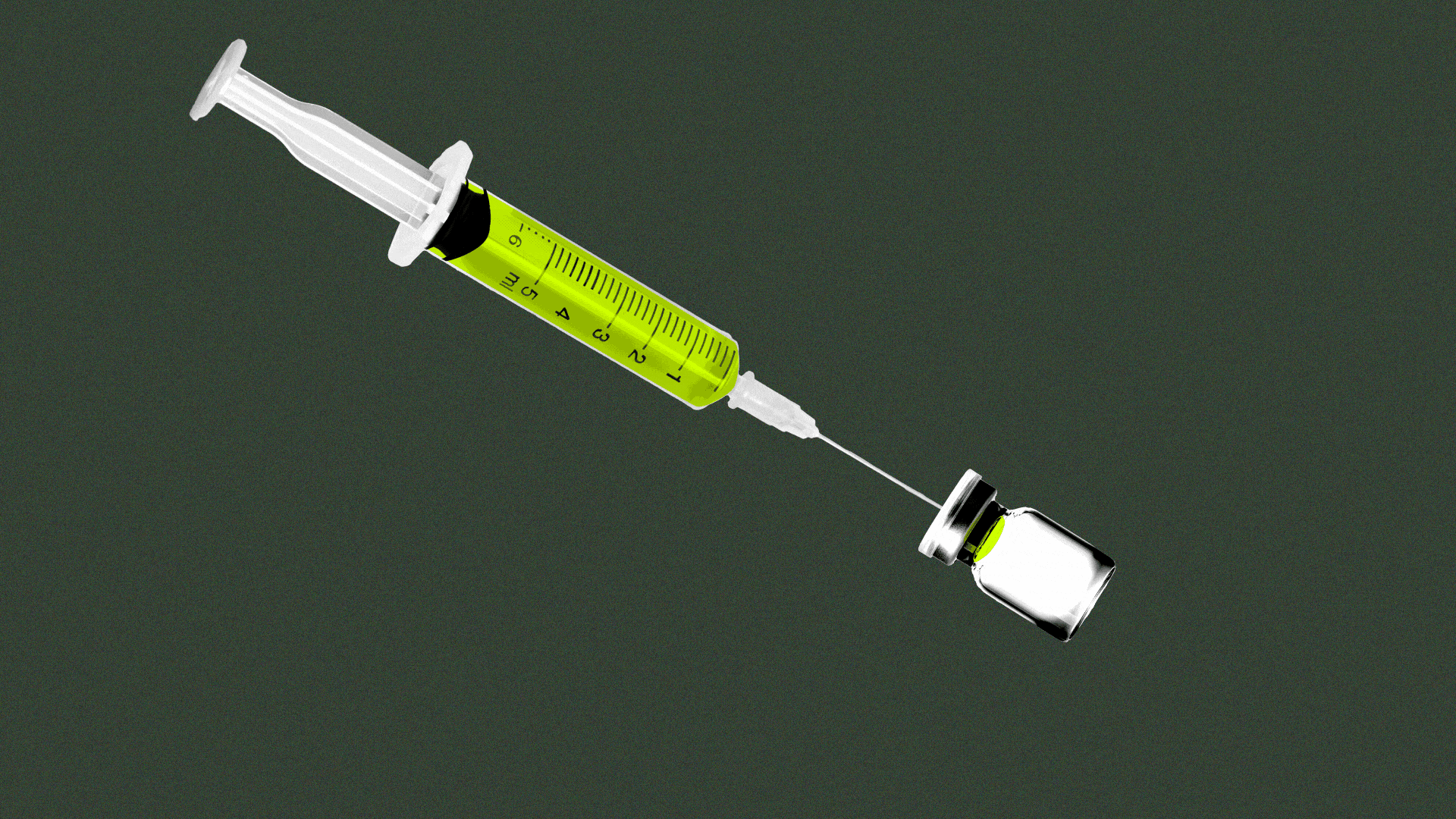| |
| |
| |
| Presented By Blue Cross Blue Shield Association |
| |
| Axios Vitals |
| By Tina Reed · May 16, 2022 |
| Welcome back to the workweek, Vitals readers. Today's newsletter is 964 words or a 4-minute read. Situational awareness: More fiscal 2023 health spending hearings are on tap in Congress this week. The NIH is up first with testimony on Tuesday in front of the Senate Appropriations Labor-HHS subcommittee. Then, FDA commissioner Robert Califf on Thursday goes before the House Appropriations subcommittee that oversees his agency. |
| |
| |
| 1 big thing: What the end of America's public health emergency could mean |
 |
|
| Illustration: Natalie Peeples/Axios |
| |
| The Biden administration is expected to signal this week whether it's ready to end the COVID-19 public health emergency — which would affect a host of health care policies, including vaccines for kids, Axios' Adriel Bettelheim and I write. Why it matters: Ending the emergency would allow a president who campaigned on ending the pandemic to declare victory over the virus. But the complex series of policy changes — and the continued threat of more COVID waves — could leave the government ill-prepared for whatever comes next. Driving the news: The Department of Health and Human Services in April extended the emergency declaration through July 15, and has said it would give states and health providers 60 days' notice before it ends. - That makes Tuesday the decision deadline.
What they're saying: The public is eager to put COVID in the rearview and generally unwilling to give Biden much credit for the recovery. Extending a state of emergency in that kind of climate could almost be seen as an admission of failure. - But hospitals, physician groups and advocacy organizations like AARP say keeping the emergency status is essential to maintain flexibility in the health care system as new variants emerge and the effectiveness of currently available vaccines wanes.
- A decision to end the emergency "will be based on political considerations and not likely the consensus of the scientific community inside and outside of the administration," Raymond James analyst Chris Meekins wrote in a recent report.
Go deeper. |
    |
| |
| |
| 2. Vaccines could have prevented 319K deaths |
 Data: Brown School of Public Health; Map: Thomas Oide/Axios Vaccines could have prevented roughly 319,000 COVID-19 deaths between January 2021 and last month, according to a new analysis from researchers at Brown School of Public Health, Brigham and Women's Hospital, Harvard T.H. Chan School of Public Health and Microsoft AI for Health. In other words: At least every second person who died from COVID-19 since vaccines became available might have been saved by getting the vaccines, they said. - States where the most lives could've been saved by vaccines include West Virginia, Wyoming, Tennessee, Kentucky and Oklahoma, according to a dashboard released by the health organizations.
- "The vaccine rollout has been both a remarkable success and a remarkable failure," Brown's Stefanie Friedhoff, one of the analysis' authors, told NPR.
|
    |
| |
| |
| 3. Novavax confident approval is coming |
 |
|
| Illustration: Brendan Lynch/Axios |
| |
| Officials at Novavax say they're confident their COVID-19 vaccine will receive an emergency use authorization from the FDA early next month, CNBC reports. Why it matters: The Maryland company received $1.6 billion from the federal government to speed development of the shots early during the pandemic but has yet to make it to the U.S. market. - Yet its protein-based COVID vaccine — which uses moth cells to produce shots — has been slowly gaining favor in the EU and the U.K.
- The biotech's request for authorization is scheduled for a review on June 7 by a key FDA advisory committee.
Be smart: While Novavax is "fashionably late to the COVID-19 vaccine party," as FiercePharma put it last month, it could be well-positioned as the pandemic drags 0n and questions about the durability of other vaccines remain. |
    |
| |
| |
| A message from Blue Cross Blue Shield Association |
| Transforming mental health care in America |
| |
 |
| |
| 1 in 5 Americans will struggle with a mental health condition this year. What you need to know: Blue Cross and Blue Shield companies are putting Americans and their mental health first, tackling barriers that are most urgent. Learn more this Mental Health Awareness Month. |
| |
| |
| 4. Prostate cancer test benefits outweigh harms |
 |
|
| An image of a prostate which was biopsied for prostate cancer. Photo: Michael Macor/San Francisco Chronicle via Getty Images |
| |
| The blood test used to detect prostate cancer may be more effective at preventing deaths — particularly among Black men — than previously thought, according to a study in NEJM Evidence. Why it matters: Prostate cancer has one of the most pronounced disparities by race of any cancer, and Black men have historically been underrepresented in trials despite having double the risk of dying from it, the authors write. Zoom in: Previous studies found prostate-specific antigen (PSA) screening prevented one death for every 23 men diagnosed, resulting in overdiagnoses and overtreatment. - In this study, led by Weill Cornell Medicine, researchers took another look, using additional data and estimates for men of all races.
- They ultimately calculated one death was prevented for every 11 to 14 men of all races diagnosed using PSA screening.
- For Black men, screening prevented one death for every eight to 12 men diagnosed and one death for every five to nine men treated for prostate cancer, they found.
Side note: Bristol Myers Squibb Foundation is among the study's funders. Bristol Myers Squibb has prostate cancer drugs under development, The bottom line: "These data should prompt policymakers to reconsider the utility of PSA-based prostate cancer screening, particularly for Black men," the authors wrote. |
    |
| |
| |
| 5. Quote du jour |
| "I have lost far more than just my nursing license and my career. I will never be the same person ... When Ms. Murphey died, a part of me died with her." — Former Tennessee nurse RaDonda Vaught, who was convicted of two felonies for a fatal drug error, at her sentencing hearing on Friday, KHN reported. She avoided prison time but her case has been alarming to some nurses who say they are fearful of the criminalization of medical mistakes. |
    |
| |
| |
| 6. USDA urges flexibilities amid formula shortages |
 Data: Datasembly; Chart: Erin Davis/Axios Visuals The Biden administration called for states to extend flexibility to recipients of supplemental nutrition benefits amid a nationwide baby formula shortage. What's happening: Shortages have largely been blamed on a recall earlier this year, although, like all things, the supply chain problem is much more complex. What they're saying: "We continue to hear reports of WIC participants who are unable to purchase infant formula available on store shelves," wrote Stacy Dean, USDA's deputy undersecretary of food, nutrition, and consumer services. Driving the news: The USDA sent a letter to state health commissioners on Friday, reiterating the flexibility they can extend to recipients of the Special Supplemental Nutrition Program for Women, Infants, and Children (WIC). - That includes allowing WIC participants to exchange recalled baby formula and use their benefits, to purchase non-recalled formula.
- Since WIC recipients often have limits regarding which container size or brand of formula they can buy, the USDA also urged state agencies to work with legal counsel, procurement offices and infant formula rebate contractors to determine substitutes — or obtain waivers to relax rules.
|
    |
| |
| |
| A message from Blue Cross Blue Shield Association |
| Transforming mental health care in America |
| |
 |
| |
| 1 in 5 Americans will struggle with a mental health condition this year. What you need to know: Blue Cross and Blue Shield companies are putting Americans and their mental health first, tackling barriers that are most urgent. Learn more this Mental Health Awareness Month. |
| |
 | It's called Smart Brevity®. Over 200 orgs use it — in a tool called Axios HQ — to drive productivity with clearer workplace communications. | | |
Post a Comment
0Comments